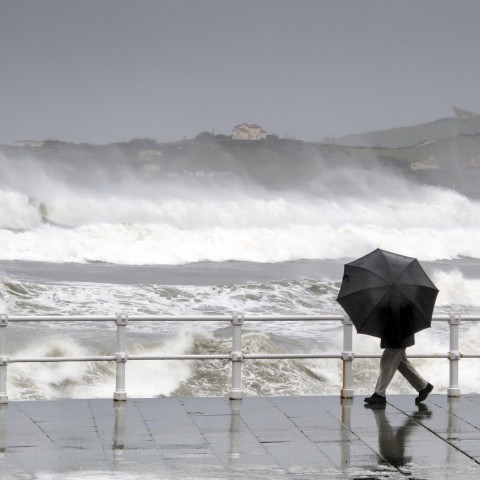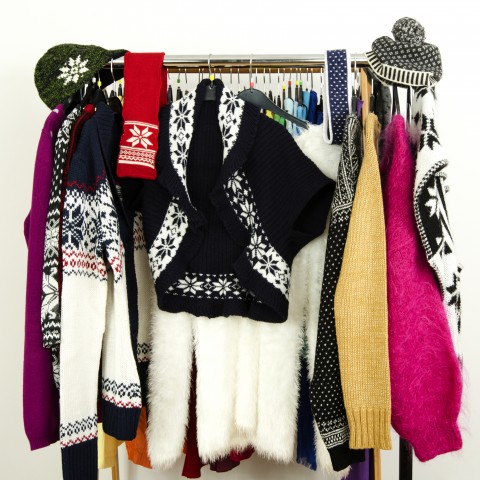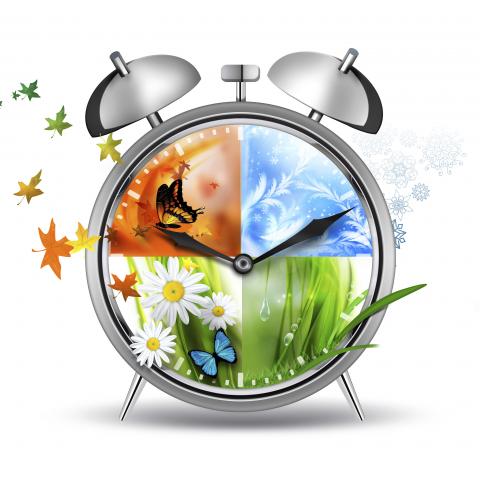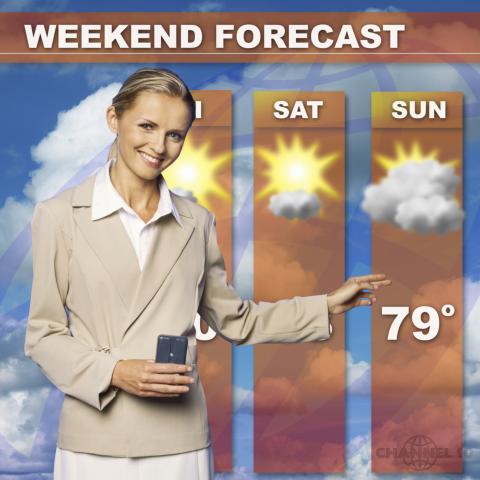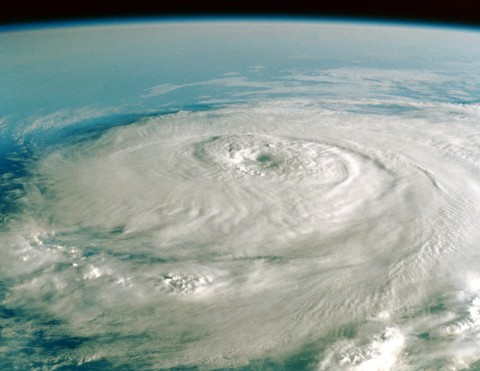Do you often imagine yourself as Nicolas Cage in the movie The Weather Man? Are you looking for a couple of lines to chat with your French neighbors or catch the attention of a charming coworker by talking about the weather in Paris, France? Or are you engrossed in how climate change is threatening the future of mankind and eager to tell everyone about it?
No matter your level of French, commenting on the weather is a common way to engage in conversation with someone you don’t know anything about, as it’s the kind of innocuous universal topic anybody can talk about. Sure, it may not lead to a passionate debate (or maybe it will, on how the weather used to be forecasted before the time of satellites!) or a thought-provoking exchange of opinions, but as an ice-breaker or a casual conversation topic among strangers, it gets the job done.
In this article, we’ll cover everything you need to know to talk about the weather in French, from sunny days to pouring rain, and misty mornings to windy nights.
- What is the Weather Today?
- What is Your Favorite Season?
- Be the Coolest and the Hottest!
- How to Break the Ice?
- Is it True that the French Dislike Small Talk?
- How FrenchPod101 Can Help You Learn More French
1. What is the Weather Today?
1- Just Four Easy Phrases
Talking about weather in French is nothing complicated. Describing the different weather conditions in French comes down to only four common sentences, and nothing more. How beautiful is that?
- il fait ___ (it does ___)
- il y a ___ (there is ___)
- il ___ [verb] (it ___)
- c’est ___ [adj] (it is ___)
Using only these four structures, you can describe any kind of weather in French. Let’s have a closer look before moving onto French weather vocabulary:
- il fait ___ is used to describe the most basic weather states.
- il fait chaud (it is hot; literally “it does hot,” when translated)
- il fait très froid (it is very cold)
- il fait frais (it is fresh)
- Il fait humide (the weather is humid)
- il fait beau (the weather is good, literally “it makes beautiful,” when translated)
- il fait moche (the weather is ugly)
Now, these two can be heard depending on the region, generation, and education of the speaker:
-
- il fait du vent (it is windy)
- il fait (du) soleil (it is sunny)
I would personally use il y a instead. Let’s check it out now.
- il y a ___ is used for basic weather states, when il fait doesn’t do the job.
- il y a du brouillard (there is fog)
- il y a du vent (there is wind)
- il y a du soleil (there is sun)
- il___ [verb] is followed by a verb and used mostly when the sky is pouring something on you.
- il pleut (it is raining)
- il neige (it is snowing)
- il grêle (it is hailing)
- c’est ___ [adj] is followed by adjectives to describe the weather in French when talking about basic weather states.
- c’est pluvieux (it is rainy)
- c’est nuageux (it is cloudy)
- c’est orageux (it is stormy)
2- Weather Pocket Dictionary:
Now that you have the four basic sentences, all you need is a bit of vocabulary before you can take over Évelyne Dhéliat as the French’s favorite weatherman!
| Le soleil “The sun” |
Il y a eu du soleil toute la journée ! “It was sunny all day long!” |
| La pluie “The rain” |
Il pleut toujours beaucoup en mai. “It is always very rainy in May.” |
| Les nuages “The clouds” |
Il y a des nuages depuis ce matin, il va pleuvoir. “There have been clouds since the morning; it is going to rain.” |
| La neige “The snow” |
J’espère qu’il y a assez de neige pour skier. “I hope there is enough snow to ski.” |
| Le brouillard “The fog” |
Le brouillard se lève souvent dans la matinée. “The fog often lifts during the morning.” |
| La grêle “The hail” |
Une averse de grêle peut causer de sérieux dégâts. “A hailstorm can cause serious damage.” |
| Le verglas “The black ice” |
Le verglas est une couche de glace qui se forme sur les routes. “Black ice is a coating of ice that appears on a road surface.” |
| Le vent “The wind” |
L’avion ne pourra pas décoller avec un vent pareil. “The plane won’t be able to take off with such a wind.” |
| L’orage La tempête “The storm” |
Ca va être un orage fantastique ! “It’s gonna be a terrific storm!” |
| La foudre “The thunder” “The lightning” |
Il y a plus de chance d’être frappé par la foudre. “Got a better chance of being struck by lightning.” |
-
→ Make sure to visit our vocabulary list about Weather Words and Expressions, with audio recording to practice your pronunciation. It’s freely available on FrenchPod101.
Il pleut à verse ! (“It’s pouring!”)
3- Be Weatherproof!
I usually don’t use an umbrella. I find them bulky, easy to break, and they make a mess in your bag if you didn’t dry them properly.
Why am I talking about this? Because when talking about adverse weather in French, you can’t skip out on humanity’s reactions to it. We’ll now have a look at all of mankind’s amazing inventions to void nature’s attempts at making us wet, cold, and miserable.
| Un parapluie “An umbrella” |
N’oublie pas ton parapluie ! “Don’t forget your umbrella!” |
| Un manteau “A coat” |
J’ai un gros manteau pour l’hiver. “I have a big coat for the winter.” |
| Un imperméable Un imper [Familiar] “A raincoat” |
Sans mon imper, je serais déjà trempé. “Without my raincoat, I would be soaked already.” |
| Un K-Way “A windcoat” |
(Like Kleenex® or Caddie®, K-Way® is a brand used a noun) J’ai toujours un K-Way dans mon sac, au cas où. “I always have a windcoat in my bag, just in case.” |
| Des gants “Gloves” |
Je ne peux pas utiliser mon téléphone avec mes gants. “I can’t use my phone with my gloves.” |
| Une écharpe “A scarf” |
Mets ton écharpe ou tu vas t’enrhumer. “Put your scarf on or you’ll catch a cold.” |
| Un bonnet “A winter hat” |
Mon bonnet est humide à cause de la neige. “My hat is wet because of the snow.” |
| Des lunettes de soleil “Sunglasses” |
S’il fait beau, je porterai mes lunettes de soleil ! “If the weather is nice, I will wear my sunglasses!” |
-
→ Don’t let the cold bite you! Bundle up in your coat, scarf, and boots and learn all these words with our free vocabulary list on Winter Clothes.
Les vêtements d’hiver (“Winter clothes”)
2. What is Your Favorite Season?
There was a not-so-distant time when I would answer “spring.” Nowadays, I would say “season 3” for Game of Thrones and “season 4” for The Wire. What about you?
If you’re still in touch with Mother Nature, though, let’s talk about the passing of seasons and weather in French as you can witness it from your window, not your TV screen.
1- France has Four Distinct Seasons
Thanks to its temperate climate, France features a whole set of seasons with well-defined weather as well as the visual enjoyment you can expect from them.
However, global warming is changing this rapidly, and the once clear demarcation of our seasons has been blurring considerably in recent years. It also brought extreme weather in French areas, including heat waves and deadly flooding, the kind of which we’d never seen before.
Here’s how seasons usually look in France, so you can easily hold a discussion about seasons and weather in French:
- Le printemps (Spring)
Spring is the saison de l’amour (season of love) in France, when nature wakes up from its winter sleep. As for spring weather in French regions, trees are getting their green back, flowers are blooming, and forests are filled with the voices of thousands of birds. It’s also fairly wet and rainy—there is a price to pay for all of these vibrant colors!
- L’été (Summer)
The rain quiets down, temperatures rise to around 30°C (86°F), and girls dress shorter. Coasts can be especially welcoming, with warm yet not hot temperatures and infrequent rains. Beware of canicules (heatwaves) where temperatures can rise to a whopping 43°C (109.4°F) which is 2018’s highest peak.
With the lovely French weather in summer, wildlife thrives in our numerous national parks and reserves, and hikers can easily meet all kinds of chamois, deer, beavers, and countless species of birds.
- L’automne (Fall)

The trees are turning yellow and red, leaves are falling, and the French return from their summer vacations. This is also the main wine season, with les vendanges (the grape harvest) taking place in September, and some delicious vintage coming in the following month. Rainfalls are back with a vengeance, especially in the north.
- L’hiver (Winter)
Northerly winds bring cold weather from the Manche (English Channel) to the Méditerranée (Mediterranean Sea), but the country remains remarkably popular among tourists.
French winter can be especially welcoming in Paris, with clear days and blue skies, while the temperature rarely drops below zero. In the mountains, it can be much harsher with chilly winds and abundant snowfall.
Les quatre saisons (“The four seasons”)
2- Talking About the Seasons
Here are the most important words and expressions to talk about the seasons, as well as examples to illustrate how to use each one in association with our pocket weather dictionary!
| Une saison “A season” |
C’est ma saison préférée ! “This is my favorite season!” |
| Le printemps “Spring” |
La nature s’épanouit au printemps. “Nature is blooming in spring.” |
| L’été “Summer” |
Une pluie d’été ne dure jamais. “A summer rain never lasts.” |
| L’automne “Fall” |
L’automne est la meilleure saison pour voyager pas cher ! “Fall is the best season for cheap travels!” |
| L’hiver “Winter” |
L’hiver vient. “Winter is coming.” |
-
→ Get ready to work on your tan and beach body while reviewing our free vocabulary list on the Essential Summer Vocabulary.
3. Be the Coolest and the Hottest!
The most important things to know when talking about temperatures is that the French use the Celsius system.
If you hear your French friend talking about 30° in the summer, it means very warm weather (86°F), and not the below freezing it would be in Fahrenheit.
Also keep in mind that most French don’t know how to handle the Fahrenheit system. If you mention that in your room, the temperature can reach 86° during summer, they might get really worried about your health. (86°C is 187°F!)
Here are the most common words and structures to talk about temperatures:
| Le temps “The weather” |
Il fera quel temps demain ? “What will be the weather tomorrow?” |
| La température “The temperature” |
Il fait quelle température ? “What is the temperature?” |
| Degré “Degree” |
Couvre-toi bien, il fait 5 degrés aujourd’hui ! “Bundle up, it is 5 degrees today!” |
| Geler “To freeze” |
Il a gelé cette nuit. “It was freezing last night.” |
If you ever see this kind of number in Celsius, get a fire extinguisher!
4. How to Break the Ice?
Stay frosty and chill out: it’s slang time!
If you want to sound like a native speaker, it’s good to know your slang. There’s a wide range of colorful expressions for discussing weather in French, and most of these are so popular that they don’t sound especially familiar.
| Il pleut à verse. “It is pouring rain.” |
Verser actually means “to pour.” |
| Il pleut des cordes. “It is pouring rain.” |
Literally: “It’s raining ropes.” |
| Il pleut comme vache qui pisse. [Familiar] “It’s raining cats and dogs.” (raining heavily) |
Literally: “It’s raining like pissing cow.” France, world capital of elegance. |
| Je suis trempé jusqu’aux os. “I’m soaking wet.” |
“I’m drenched to the bones.” |
| On s’est fait rincer. “We’ve been soaked.” |
“We’ve been rinsed.” |
| Il y a de l’orage dans l’air. “There is a storm brewing.” (a storm is coming) |
“There is a storm in the air.” |
| Il y a un vent à décorner les boeufs. “It’s blowing a gale.” (there is a strong wind) |
“There is a wind that could de-horn the oxen.” |
| Je me gèle les miches. [Familiar] “I’m freezing my butt off.” |
Equally popular is the short version: Je me les gèle. (I’m freezing it.) |
| Il fait un froid de canard. “It’s brass monkey weather.” (it’s really cold) |
Literally “a duck’s cold,” this hunting expression refers to how ducks are easy prey when their pond is frozen. How sad… |
| ça caille or ça pèle “It clots” or “It peels” |
When it’s so cold that your blood is clotting and your skin is peeling. |
| Je crève de chaud. [Familiar] “I’m burning up.” (I’m really hot) |
“I’m dying from the heat.” |
| C’est une l’étuve, ici. “It’s hot as an oven in here.” |
Une étuve is not exactly an oven. The word is used mostly in cuisine or medicine to describe a heating appliance. |
-
→ From freezing to melting, learn more ways to describe the weather in French using additional weather words and expressions with our free vocabulary list on the Top 15 Weather Conditions.
5. Is it True that the French Dislike Small Talk?
No. Next question, please! Well, seriously, I’ve read this question several times and it’s time to address it. Do we love small talk? Is it our favorite pastime? Certainly not. But do we hate it? Usually not.
Small talk is perfectly fine with strangers or vague acquaintances you don’t have much in common with that you can talk about. It could be a neighbor you meet once in a while on the staircase and whose name you don’t know, your hairdresser, or the old tenant of the bakery next door.
Why “old tenant?” Because there is also a generational component. Older generations tend to be more welcoming to small talk than younger folks who may find it fake or shallow.
We call it parler de la pluie et du beau temps (to talk about the rain and good weather), and people who are afraid of an awkward silence use it to fill in the blanks. But many French were taught to stay quiet when they don’t have anything interesting to say, and talking for the sake of it doesn’t come as naturally as it does in more effusive cultures.
It’s not snobbism or elitism that sometimes makes us frown upon small talk; it’s a belief that it doesn’t take a college degree to talk about meaningful experiences, the political situation, good food, exciting movies, or really anything worth sharing. And life is just too short to talk too much about the weather.
Now, does it mean that you should stay away from any meteorological comment? Absolutely not! I’m just highlighting a difference in cultural backgrounds, but asking or commenting on the weather with your French friends, coworkers, or everyday encounters is perfectly fine, as long as you don’t make it your only topic!
This is not whipped cream, it’s a hurricane.
6. How FrenchPod101 Can Help You Learn More French
In this guide, you’ve learned a lot about how to talk about the weather, from useful keywords to common sentences and slang. Did we forget any important expression you’d like to know about?
Do you feel ready to engage in a conversation about the weather in French and pose as an expert meteorologist, using everything you’ve learned today?
Make sure to explore FrenchPod101, as it has plenty of free resources for you to practice your French grammar and learn new words. Our vocabulary lists are also a great way to revise the words and learn their pronunciation, to help you speak like a native in no time.
Remember that you can also use our premium service, MyTeacher, to get personal one-on-one coaching. Practice talking about weather conditions in French with your private teacher so they can give you personalized feedback and advice, and help you improve your speaking skills.
About the Author: Born and bred in the rainy north of France, Cyril Danon has been bouncing off various jobs before he left everything behind to wander around the wonders of the World. Now, after quenching his wanderlust for the last few years, he’s eager to share his passion for languages.





